Although most of the women were drenched, they were all cheerful, and seemed proud of taking an active part in the great struggle. And if a young man asked a girl whether he should ride next to her to help her, the answer was: ‘No, thank you, we can manage; the men must fight now.’ There were many old men and boys who preferred the society of the women to the danger of the bombs. Some of the women were not kind, and reproached us for being the cause of all this misery, as our appearance in the Hoogeveld had brought the enemy in its train.
The waggons were heavily laden with furniture and grain, some even with stoves, and they sank deep into the mud, as the roads were one mass of mud after the numerous waggons and thousands of cattle that had already passed along them. Long rows of vehicles were continually approaching from all sides, all going in the same direction, and when we came to Waterval River a sad but grand sight met our eyes. The river was full. Hundreds of waggons had been outspanned on the banks on either side. The women and children were doing their best to light the fires with the wet wood, and to cook some food. It was just before sunset, but there was no sun to cheer them on their way.
Against the sides of the mounds (bulten) the cattle were moving in black dense masses, making an almost deafening noise with their bleating and lowing. As we rode through the full river, we saw in mid-stream a cart that had stuck fast. A woman was standing in the water pushing at the back, while a girl held the reins. A few of our men jumped down from their horses and soon succeeded in getting the cart to the other side. But we could not stay to help the poor women and children. We rode on, inquiring everywhere after the trolleys and the commissariat. These were higher up on the other side of the river, so we had to cross once more, this time in the dark, at the risk of our lives.
Two little girls were drowned that evening, and the wheel of a waggon had passed over a girl’s body. It had been better if the women had stayed at home and depended on the mercy of the enemy. They should not have undertaken this terrible journey. A woman cannot flee from place to place like a man, and life in a ’refugee’(?) camp would have been better; she should bear her sorrow bravely at home. And this was only the beginning of the misery. If they had remained at home, they might have saved their homes, but now the enemy was sure to destroy and burn the deserted farms.
During the day, when the flight was still a novelty, the women and girls were cheerful enough, but who can describe their heartache and misery during their enforced journey on the rainy nights? I do not know how all those waggons and cattle got through the swollen river that night. Twenty paces from where I lay a waggon was being inspanned; I heard the voices of men and women. An old man was talking. He threatened to off-load all the women on the first




